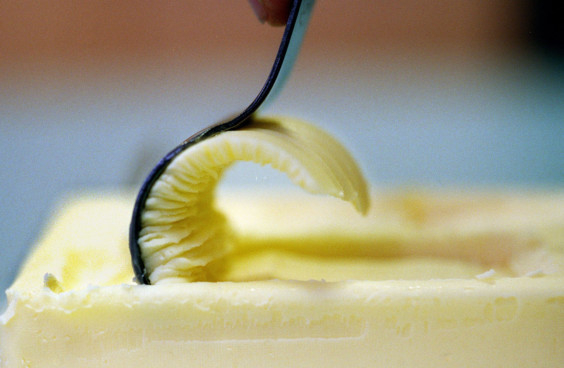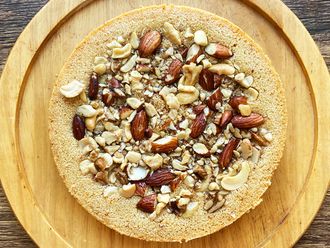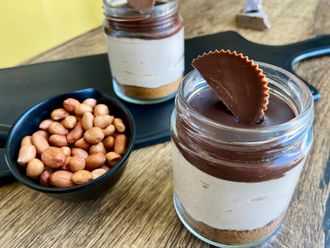
On a weekend morning not long ago, I found myself in the kitchen, near the burner, whisking eggs while a pan absorbed the heat from a light flame. I was making breakfast for a few friends. The mood was light. The coffee was dark. Music played in the background, and everyone sat silently, anticipating the meal.
That is, until I reached for the butter.
“That’s a lot of butter,” one friend uttered from behind a newspaper.
“Is there any olive oil?” another asked.
“Yeah, I would really prefer olive oil,” a third joined in. “If that’s OK,” he added, softening the demand.
I looked down at the poor, marginalised, misunderstood stick of coagulated deliciousness. And then back up at the table, where the butter skeptics sat. Three rather slender men in their late twenties, terrified of a little dairy fat.
“Fine, I’ll make my eggs separately,” I said, audibly disappointed. “But I’m not sharing.”
Call it the tyranny of olive oil. Many Americans — having heard about the benefits of olive oil — now quiver at the mere sight of butter. Rather than swap out butter for its heart-healthier alternative from time to time — so that one can enjoy the way the former renders vegetables, browns meats, and, yes, makes eggs as near perfect as humanely possible — the answer has instead been to elbow it out almost completely.
The heavy-handed response can be seen on popular food blogs, where suggestions for substitutes abound. It can also be found on the Food Network, where celebrity chef Rachael Ray has touted extra-virgin olive oil, pouring it over food like gravy over mashed potatoes.
The tyranny of olive oil has been decades in the making. In 1989, The New York Times nodded to the subtle but important shift touching sauté pans all across America. “More and more,” writer Moira Hodgson observed, “I find myself using olive oil for cooking instead of butter.” At the time, olive oil wasn’t yet a kitchen staple, let alone a common replacement for butter. Not here, in the United States, anyway. The average American still only used about 225l of it each year, according to data from the USDA (United States Department of Agriculture).
Hodgson seemed to understand this. Her ode to the Mediterranean oil included elementary-level advice about how to store it (not in the refrigerator!) and use it (on everything! basically).
Twenty five years later, thanks in large part to both a growing body of olive oil-friendly research and healthy dose of industry-funded marketing, no such advice is needed. In the time since Hodgson’s piece, titled Olive Oil Replaces Butter in Many Dishes, the use of olive oil has quadrupled in the United States. In 2010, the latest year for which consumption data is available, Americans drizzled some 272 million litres worth of the stuff, according to the USDA.
Butter consumption, meanwhile, has risen in recent years, but not nearly as substantially. Its ascent has been less of a revelation about butter than a revolt against margarine, its once formidable but increasingly irrelevant competitor.
Few things have catapulted olive oil quite like the furious push in the 1990s, largely by Oldways, a non-profit organisation which has worked with leading scientists, nutritionists, and health advocates around the world to promote, among other things, the relative benefits of the Mediterranean Diet, of which olive oil is a key component.
The group, which was conceived in 1990 after its founder K. Dun Gifford returned from a trip to Italy, managed to obtain funding from scores of food companies, health initiatives, and international organisations. Among them are the International Olive Oil Council, Italian Trade Commission, and Olive and Olive Oil Promotion Committee of Turkey.
“They were really great about getting publicity,” said Marion Nestle, a professor of nutrition and food studies at New York University.
Nestle should know. In the early 1990s, shortly after the group was founded, she agreed to be one of its advisers. She has since left, but other highly respected scientists remain, including Walter Willett, one of the country’s foremost voices on nutrition.
“There was ample evidence that olive oil was healthy and good, at least relatively speaking,” said Nestle. “Oldways picked this up and put an enormous effort into ensuring that the research continued, into making sure that people found out about its benefits.”
The thing about that advertising is that it often works. Especially when the health winds are at your back. A study published last year by researchers at the University of California, Davis, found that marketing has been and will likely continue to be a powerful booster of the cooking oil’s popularity.
News articles about the healthiness or culinary benefits of olive oil contribute significantly to America’s rising demand for olive oils. Given the stock of articles and the value of America’s import of olive oils as of 2012, 100 more articles on the health or culinary benefits of olive oil would increase the value of US annual import of olive oils by about $1.6 (Dh5.87) million in the long run.
On its website, Oldways houses a tutorial of sorts, a list of ways to use olive oil. Several of them suggest switching butter out for olive oil. One — the second from the top — even addresses the now sore topic of cooking eggs.
In all, butter is mentioned six times. Olive oil’s competition is made rather clear.
The truth is I have nothing against olive oil. In fact, I’m pretty fond of it. There is little debate about the relative benefits of using it. It’s cholesterol free and monosaturated fat rich, and an essential part of one of the world’s healthiest diets. Even the US government agrees: the Mediterranean diet is now listed by the official nutritional guidelines as one of three diets that are worth mimicking.
But butter isn’t necessarily the assassin many have made it out to be.
A study published last year in the journal Annals of Internal Medicine, which involved a meta-analysis of 75 different studies, suggests there isn’t convincing evidence that saturated fat — which butter has, but olive oil does not — increases the risk of heart disease. “You can go back to eating butter, if you haven’t already,” former New York Times food columnist Mark Bittman wrote in response.
Some, it seems, have. The lipid has enjoyed a revival of sorts, especially in comparison to margarine.
But the thing is that olive oil still casts a shadow over the dairy fat, causing people to forgo butter at every opportunity, or feel bad about eating it when they don’t. And it shouldn’t.
“Is olive oil better for you? Yes, probably,” said Nestle. “But does that mean you should never eat butter? No, of course not. Butter is fine as long as you don’t overdo it.”
— Washington Post

















